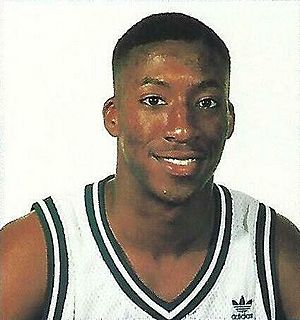Brian Davis (basketball) facts for kids

Davis with Duke in 1988
|
||||||||||||||
| No. 23 | ||||||||||||||
|---|---|---|---|---|---|---|---|---|---|---|---|---|---|---|
| Small forward / shooting guard | ||||||||||||||
| Personal information | ||||||||||||||
| Born | June 21, 1970 Atlantic City, New Jersey, U.S. |
|||||||||||||
| High school | Bladensburg (Bladensburg, Maryland) |
|||||||||||||
| Listed height | 6 ft 7 in (2.01 m) | |||||||||||||
| Listed weight | 200 lb (91 kg) | |||||||||||||
| Career information | ||||||||||||||
| College | Duke (1988–1992) | |||||||||||||
| NBA Draft | 1992 / Round: 2 / Pick: 48th overall | |||||||||||||
| Selected by the Phoenix Suns | ||||||||||||||
| Pro career | 1992–2000 | |||||||||||||
| Career history | ||||||||||||||
| 1992–1993 | Pau-Orthez | |||||||||||||
| 1993–1994 | Minnesota Timberwolves | |||||||||||||
| 1994–1995 | Pittsburgh Piranhas | |||||||||||||
| 2000 | Aliağa Petkim | |||||||||||||
| Career highlights and awards | ||||||||||||||
|
||||||||||||||
|
Medals
|
||||||||||||||
Brian Keith Davis (born June 21, 1970) is an American former basketball player and a successful businessman. He is known for his time playing college basketball for the Duke Blue Devils, where he helped his team win two national championships in a row.
Contents
Brian Davis: Basketball Star and Businessman
College Basketball Success
Brian Davis played college basketball for the Duke Blue Devils from 1988 to 1992. He was a key player on two amazing teams. These teams won the NCAA national championship. The victories happened in 1991 and 1992. Winning back-to-back championships is a huge achievement in college sports!
Professional Basketball Journey
After college, Brian Davis was chosen by the Phoenix Suns in the 1992 National Basketball Association (NBA) draft. However, he first played basketball in France for a team called Élan Béarnais Pau-Orthez during the 1992–93 season.
He then made his NBA debut with the Minnesota Timberwolves in the 1993–94 season. Brian Davis played in 68 NBA games during his career. He averaged about 5.5 minutes per game. In total, he scored 131 points, which is about 1.9 points per game.
Life After Basketball
Brian Davis has a very close friendship with his former Duke and Timberwolves teammate, Christian Laettner. They have worked together on many business projects. These projects include developing real estate. They also started a company called D.C. United Holdings in 2007. This company owns D.C. United, a professional soccer team in Major League Soccer.
See also
 In Spanish: Brian Davis (baloncestista) para niños
In Spanish: Brian Davis (baloncestista) para niños
 | DeHart Hubbard |
 | Wilma Rudolph |
 | Jesse Owens |
 | Jackie Joyner-Kersee |
 | Major Taylor |

